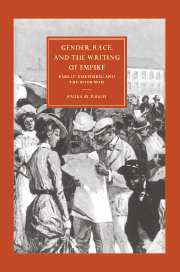Book contents
- Frontmatter
- Contents
- Acknowledgments
- 1 The war at home
- 2 The concentration camps controversy and the press
- 3 Gender ideology as military policy – the camps, continued
- 4 Cannibals or knights – sexual honor in the propaganda of Arthur Conan Doyle and W. T. Stead
- 5 Interpreting South Africa to Britain – Olive Schreiner, Boers, and Africans
- 6 The imperial imaginary – the press, empire, and the literary figure
- Notes
- Works cited
- Index
- CAMBRIDGE STUDIES IN NINETEENTH-CENTURY LITERATURE AND CULTURE
3 - Gender ideology as military policy – the camps, continued
Published online by Cambridge University Press: 22 September 2009
- Frontmatter
- Contents
- Acknowledgments
- 1 The war at home
- 2 The concentration camps controversy and the press
- 3 Gender ideology as military policy – the camps, continued
- 4 Cannibals or knights – sexual honor in the propaganda of Arthur Conan Doyle and W. T. Stead
- 5 Interpreting South Africa to Britain – Olive Schreiner, Boers, and Africans
- 6 The imperial imaginary – the press, empire, and the literary figure
- Notes
- Works cited
- Index
- CAMBRIDGE STUDIES IN NINETEENTH-CENTURY LITERATURE AND CULTURE
Summary
With the concentration camps controversy, stories about women appeared in the war reports for the first time in the South African conflict. The war had boasted no Florence Nightingale and, because the Boer republics had no communities of British women and children (all had fled to the British Cape Colony at the start of trouble), chivalric patriotism could not be invoked in defense of helpless memsahibs as in the Sepoy Rebellion of 1857 (Sharpe Allegories of Empire, Brantlinger, Rule of Darkness). The Boer War, coming as it did at the cusp of Victorianism and Edwardianism, featured new anxieties and uncertainties about men's role in relation to women. The “last of the gentlemen's wars” marked a transition in Britain for both imperialism and Victorian conceptions of men's duties towards women. In the concentration camps controversy, the press and other public discourse frequently invoked shared ideology about gender and race – that is, much writing about the camps, on both sides of the issue, assumed certain shared notions in its readers about men's obligations to women and the position of Africans in relation to Europeans. These shared ideas were called upon in support of notions about Empire and about the Boer War in particular that were not shared ideology – that is, questions about Britain's role in South Africa and about its methods of prosecuting the war were matters of opinion rather than of ideology, to be openly debated in the public sphere, especially the newspapers.
- Type
- Chapter
- Information
- Gender, Race, and the Writing of EmpirePublic Discourse and the Boer War, pp. 55 - 79Publisher: Cambridge University PressPrint publication year: 1999



